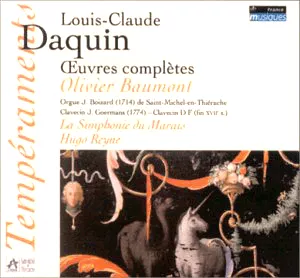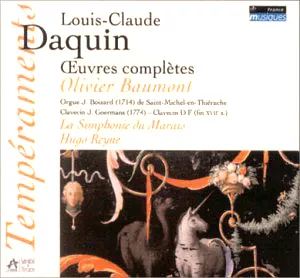Louis-Claude Daquin, premier enregistrement intégral.
Louis-Claude Daquin naquit le 4 juillet 1694 à Paris, et y mourut le 15 juin 1772. Enfant prodige, il se produisit à six ans devant Louis XIV et sa cour, et fut nommé en 1706 organiste du Petit Saint-Antoine. Sa carrière, parisienne et versaillaise, ne cessa dès lors d’être brillante : il devint organiste de Saint-Paul en 1727, succéda à Louis Marchand aux Cordeliers en 1732, à Jean-François Dandrieu à la Chapelle royale en 1739, puis à Antoine Calvière à Notre-Dame en 1755. Aujourd’hui surtout connu pour la pièce le Coucoû, ce disque présente un autre aspect de ses œuvres qui méritent d’être découvertes. Cet enregistrement réunit pour la première fois l’intégral des œuvres de Louis-Claude Daquin conservées aujourd’hui : Les quatre suites, un Air à boire et le livre de Noël.
Les quatre Suites, qui composent le recueil de clavecin de 1735, sont sans conteste parmi les meilleures de ce genre publiées à la suite des ouvrages de Couperin et Rameau.
Les trois premières Suites sont enregistrées sur de splendides instruments originaux : le clavecin de Jacques Goermans (c. 1740 – avril 1789) fait à Paris en 1774, et le clavecin aux initiales D F, très probablement de la fin du XVIIe siècle français ; tous deux conservés dans la collection de M. Yannick Guillou (château de Bény-sur-Mer, Calvados). La Quatrième Suite est interprétée ici en Concert, c’est-à-dire avec plusieurs instruments comme le suggère « l’Avertissement » (violons, hautbois, flûtes à bec, cors de chasse, basson, violoncelle, contrebasse et clavecin).
L’Air à boire en duo, édité par Jean-Baptiste-Christophe Ballard en septembre 1718 : “Amis, dans ce festin, que nôtre joye éclate”, cette pièce est la seule œuvre vocale de Louis-Claude Daquin qui ait survécu ; elle est interprétée ici sans basse continue, comme c’était fréquemment l’usage.
Le livre de Noëls de Daquin est, avant celui de Balbastre (Paris, 1770), le meilleur de ce genre en France, le plus abouti, le plus inspiré, et de loin le plus brillant et le plus “inimitable”. Le magnifique orgue Jean-Boizard (1714) de l’Abbaye de Saint-Michel-en-Thiérache a été requis pour les jouer.
Par la multitude et la variété de ses jeux, l’orgue français se métamorphose en une sorte de “Concert françois” à lui seul. Il ne peut que s’enrichir d’une pratique d’exécution qui le mêle à d’autres instruments. Comme la page de titre de Louis-Claude Daquin en laisse la possibilité, quatre de ces douze Noëls sont interprétés avec les “Violons, Flûtes, Hautbois, etc.”, l’et caetera étant ici un violoncelle et un basson.
Olivier Baumont
Daquin was born on January 4th, 1694 in Paris, dying there on June 15th, 1772. He was a child prodigy who became a prodigious mature artist with no effort. Having already given a court performance at the age of six before Louis XIV, he was appointed resident organist of the Petit Saint-Antoine in 1706. His career, in Paris and Versailles was one continual flash of brilliance : the organist of Saint-Paul by 1727, he succeeded Louis Marchand at the Cordeliers in 1732, Jean-François Dandrieu at the Chapelle royale in 1739, and Antoine Calvière at Notre-Dame in 1755. Today, many Daquin manuscripts have disappeared without a trace. This compact disc presents, for the first time, the complete Daquin repertoire as we know it today: The four Suites, Air à boire (Drinking song for duo) and the book of Noëls (Carols).
The four Suites of the 1735 harpsichord volume clearly belong to the best works of this genre published after Couperin and Rameau. The three first Suites are recorded here on two magnificent original instruments : a harpsichord of Jacques Goermans (c. 1740 – April, 1789) made in Paris in 1774, and a harpsichord known by its initials D F, a French instrument, most probably late 17th century. Both belong to the collection of Mr Yannick Guillou (at the château of Bény-sur-Mer, Calvados). The Fourth Suite is played here in concert, that is with several instruments as suggested in the introductory foreword (violins, oboes, recorders, hunting horns, bassoon, cello, double bass and harpsichord).
After les Plaisirs de la Chasse (The pleasures of the hunt) which ends the suite, comes the duo Air à boire (Drinking song), published by Jean-Baptiste-Christophe Ballard in September, 1718 : “Friends, in this feast, may your joy explode”. This piece, the only vocal work of Daquin to have survived, is performed here, as was frequently the case, without bass continuo.
Before that of Balbastre published in Paris, in 1770, Daquin’s book of Noëls (Carols) was the finest example of the genre in France, the most finished, the most inspired, and by far the most brilliant and most “inimitable”. The magnificent Jean Boizard organ (1714) of the Abbey of Saint-Michel-en-Thiérache was a must for their performance. With the multitude and variety of its stops, this French organ metamorphoses into a sort of “Concert françois” (French Concert) all by itself, and sounds even richer when performing with other instruments. As the title page of Daquin’s score indicates, four of these Noëls are to be played with “violins, Flutes, Oboes, &c.”, the et caetera being a cello and a bassoon.
translated by Jeffrey Grice
__________________________________________________
La collection TEMPÉRAMENTS – RADIO FRANCE




